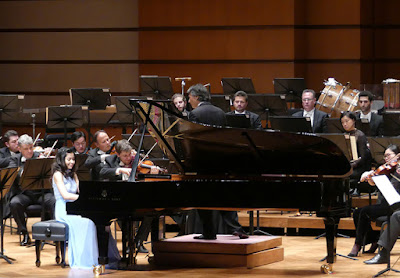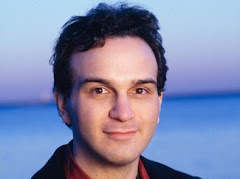German-Japanese conductor Jun Märkl made his debut with the Malaysian Philharmonic Orchestra in April 2018 with a series of vernal works by Debussy, Beethoven and Richard Strauss. For his opening work, the choice of Debussy's Children Corner Suite as orchestrated by André Caplet was an inspired idea. However, despite Caplet's expertise in orchestrating four key Debussy works, the semiquaver runs in the opening of Doctor Gradus ad Parnassum did not work well on the clarinet. It was often too sluggish in tempo and too detached in execution. The middle movements (Jimbo's Lullaby, Serenade for the Doll and The Snow is Dancing) were evocatively played. It was particularly memorable to note how Märkl encouraged the MPO principal oboist to play his haunting oboe solo in The Little Shepherd. Golliwogg's Cake-walk was a disappointment as it lacked swagger in Märkl's interpretation.
Malaysian pianist Melody Quah was the next debutant in this concert with Beethoven's Piano Concerto No 1 in C major Op 15. The opening tutti was arresting in its restraint, and Märkl’s taut control and nuanced detailing was apparent from the onset, imbuing the orchestral opening with a vigour befitting Beethoven's Allegro con brio marking. Quah's opening phrases were nicely articulated but her playing was often too choppy in her insistent use of staccato as well as a lack of judicious pedalling. She played with good accuracy, but sometimes more Beethovenian weight, attack and grandeur would not have gone amiss for most of this movement. Where Quah shone, was in her bravura playing of Beethoven's main spacious and elaborate cadenza at the end of the first movement.
Quah's tone in the second movement was too emphatic for the piano marking. This was at odds with the tranquil and introspective Largo of long, flowing and soulful hymn-like phrases. Despite this, there was notable contribution from clarinettist Gonzalo Esteban with his beautiful and limpid tone here. The Rondo finale is much the opposite of the tranquil second movement. Quah infused the extrovert piano writing with verve, swagger and jovial wit in the various appearances of the Rondo theme. A serene choir of winds provided a final moment of repose before the suitably energetic conclusion.
Strauss’ brilliant Don Juan opened the second half. The bold opening theme was played with a swagger with the MPO musicians surmounting the sizeable technical demands bar some usual trumpet and horn mishaps. In the quieter, more reflective moments, the principal oboist played his extended love song with a sumptuous lyricism. Throughout this work of extremes, Märkl painted a variegated tapestry of orchestral colour.
With its less opaque orchestration, Strauss’ Till Eulenspiegel's Merry Pranks which ended the concert fared very much better. Hornist Grzegorz Curyla's cheeky playing of the Till theme was memorable. Crisply articulated jocularity was also evident in the first clarinet solo. However, leader Peter Danis fluffed his key violin solo to the high E flat and the subsequent descending chromatic scale. The long tutti trilling fermata had oomph and precision and the gallows theme was suitably scary. Märkl’s effortless sense of Straussian syncopation and skilful tempo graduations was fluid and consistently impressive. This roguish interpretation was easily Märkl and the MPO's best performance of the night.
Thursday, 24 May 2018
Youthful musical spirits
Subscribe to:
Post Comments (Atom)


















































No comments:
Post a Comment